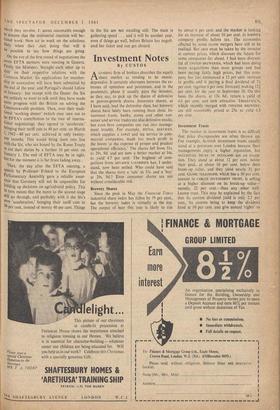Waiting to Get to Grips
From JOHN LAMBERT
r"r HE first round has ended without any points being scored. Indeed, were there not eight protagonists involved (Britain, the Six and the EEC Commission), the first three days of negoti- ations in Brussels last week, about Britain's joining the Common Market, could best be likened to those wrestling bouts where the opponents circle warily, sizing each other up and looking for the best way to grapple. Isolated on the seventh floor of a new and labyrinthine edifice at Rue des Quatre Bras, otherwise practically deserted, the delegations had a first look at their programme of work. On each point the Common Market Commission (which already looks like playing an increasingly important role) made a first statement, to which the British replied: then there was a general discussion, which never got beyond defining the problems or discussing solutions in the most general terms.
It is true that on the first day the British indica- ted their readiness to accept for the enlarged Community the external tariff (reduced by 20 per cent, on most goods) which emerges from the Dillon negotiations: but this was no new conces- sion. Although he had obviously failed to make it clear to the Six, this was merely what Mr. Heath meant-when he talked in Paris of accepting 'the structure of the CET.' The extent to which this is a blank cheque to the Six is less than it seems, since Britain has a fair idea what will come out of the Dillon round. Moreover the complement to this is the list of products for which Britain wants the duty of the enlarged Community to be reduced to nil or very near it. They are nearly all raw materials for industry (aluminium, lead, zinc, newsprint, wood pulp and a limited number of others) for which the grouP as a whole will be a nett importer : but for several of them the Six will strongly oppose the nil duty and suggest granting Britain fixed quotas only at the lower duty. The experts of the delega- tions have been meeting in Brussels this week to work out a full statistical picture of trade flows and tariffs on these products, to form a basis for work on possible solutions.
On the second day the delegations had a first look at the question of imports of industrial goods from Canada, Australia and New Zealand (again more statistics are called for) and from Hong Kong, India, Pakistan and other less-developed Commonwealth countries. As yet there was no question of examining exactly what is to be done about each particular product when the tariff preference they enjoy on the British market comes to an end. Then a first exchange of views on tropical products led on the third, as we sug- gested here a fortnight ago, to talk of what is involved in the various kinds of association with the enlarged Community which the different Commonwealth countries could seek.
For the moment it is scarcely possible to say how the negotiations are going. The atmosphere was good, and the discussions businesslike: but then the gloves have not yet come off. Indeed as a member of one of the delegations put it, `EverY- one is being almost too polite.' The delegations will be meeting again on Monday (December 4) to hear from the experts and decide what to tell the Ministers on December 8. They should in fact be in a position to present a fairly clear and detailed picture, with full circumstantial evidence, of the problems to be solved, and the factors
Which they invdIve. L seems reasonable enough t° assume that the ministerial reaction will be: Good work. Now szt to work on the solutions. Only when they start doing that will it be possible to say how things are going.
On the eve of the first round of negotiations the SeVeri EFTA partners were meeting in Geneva. Firstly the Ministers 'brought each other up to date' on their respective relations with the Common Market. Six applications for member- ship or association will have been submitted by the end of the year. and Portugal's should follow in 'January : but except with the Danes the Six are unlikely to want to talk until they have made s°111e progress with the British on solving the Commonwealth problem. Then, over their tradi- tional 'working dinner' (which may turn out to be EFTA's contribution to the lore of interna- tional negotiating), they agreed to `accelerate,' bringing their tariff cuts to 40 per cent. on March
1962-40 per cent:, achieved in only twenty- °tie months. This would bring them into line With the Six, who are bound by the Rome Treaty to cut their duties by a further 10 per cent. on January 1. The end of EFTA may be in sight, but for the moment it is far from fading away.
Then, the day after the EFTA meeting, a sPeech by Professor Erhard to the European Parliamentary Assembly gave a reliable assur- 4nee that Germany will not be responsible for holding up decisions on agricultural policy. This III turn means that the move to the second stage Will go through, and probably with it the Six's OW n 'acceleration,' bringing their tariff cuts to SO per cent, instead of merely 40 per cent. Things
in the Six are not standing still. The train is gathering speed . . . and it will be another year, even if things go well, before Britain has negoti- ated her ticket and can get aboard.







































 Previous page
Previous page